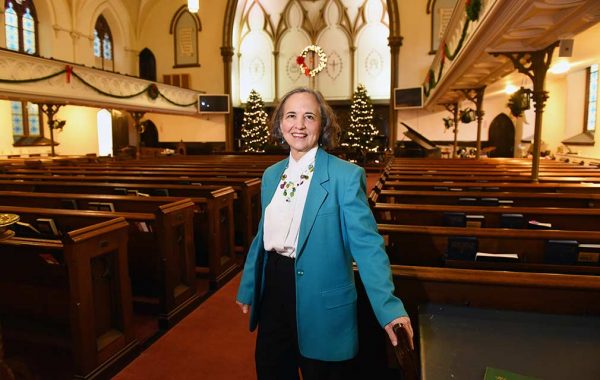
(Photo by John Carl D’Annibale/Times Union)
Reverend Marti Swords-Horrell ’77 welcomes all comers.
There’s an old saying that every pastor has only one sermon. If that’s true, Marti Swords-Horrell’s is about inclusion. “It’s not the only thing I mention, but I do tend to mention it every time,” said Swords-Horrell, pastor of Christ Church, a United Methodist church in Troy, N.Y.
Since moving to Troy two and a half years ago, she’s walked the walk as well — rallying with striking workers and Black Lives Matter protestors, reaching out to neighborhood mosques and synagogues, and even getting arrested at the state capitol in a protest over fair wage and prison issues. “Theology should never be divorced from social ethics,” she said.
Although her father was also a Methodist minister, in New York City, Swords-Horrell didn’t experience her own religious awakening until coming to Colgate. Originally planning to be pre-med, she was bowled over by a religion and philosophy course — taught first semester by Professor Andy Rembert, second by Professor M. Holmes Hartshorne — which took in everything from Plato to Kierkegaard to the Bible. “It made us ask the big questions about life: “Why are we here? What does it mean to live in community with others?”
The next year, Swords-Horrell doubled down with a religion course taught by Coleman Brown, who had just started as university chaplain. Brown challenged students to think rigorously about questions of faith. At the same time, he warmly reached out to counsel students on their concerns, holding court in a cloud of pipe smoke in his office. Coleman and his wife, Irene, welcomed students to weekly “fireside chats” at their home. Swords-Horrell said: “I dragged my roommate along and she never went back because she said it scared her to be taken so seriously.”
Swords-Horrell majored in religion, attended seminary at Yale, and then did PhD work at the University of Chicago. After being ordained in 1983, she served as a minister in Chicago, Maryland, and in several other churches in upstate New York before moving to Troy in July 2014. Today, Swords-Horrell tries to emulate the same combination of warmth and seriousness in her sermons that she observed in Brown. “That’s something I learned from Coleman,” she said. “We have to be together in a space where some people are going to be comforted and some people are going to be challenged.”
The comforts and challenges of bringing diverse people together are at the heart of her work. Her church is designated as a Reconciling Congregation that welcomes gay and lesbian parishioners. In addition, church members have worked with a local Muslim soup kitchen to knit scarves for the homeless. And, every Tuesday, the church hosts a free dinner that welcomes all comers — from homeless and working poor to students and families. “People can come to eat and converse with someone whose background is different from their own,” she said. “We are glad to be able to offer space to feed both body and soul this way.”
In June of 2015, she joined a Moral Monday rally at the New York State Capital in Albany as part of a multifaith delegation to push for a slate of progressive issues, including support for a higher minimum wage and paid family leave, and opposing police brutality and solitary confinement in prison. “They were all of these bills [lawmakers] said they didn’t have time to look at, but they had time to pass bills that gave tax cuts to yacht owners,” she said. When she and a dozen other protesters sat down to block a door to the Senate chambers, they were arrested and put on six months’ probation. Since then, minimum wage and family leave bills passed — although there is still much work to be done on the criminal justice issues, she said. “I am grateful I felt compelled to take a stand,” she added. “You have to be public about what you think and believe.”
— Michael Blanding






